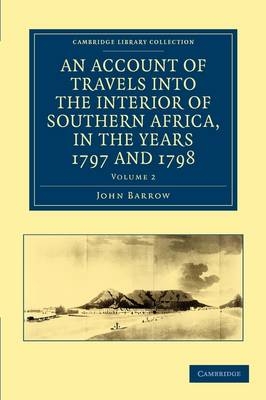
An Account of Travels into the Interior of Southern Africa, in the years 1797 and 1798
Including Cursory Observations on the Geology and Geography of the Southern Part of that Continent
Seiten
2011
Cambridge University Press (Verlag)
978-1-108-03278-0 (ISBN)
Cambridge University Press (Verlag)
978-1-108-03278-0 (ISBN)
English writer and explorer Sir John Barrow (1764–1848) spent 1797–8 exploring the recently acquired Cape Colony. His observations were published in two volumes, with the first appearing in 1801 and the second in 1804. Volume 2 examines the commercial and military advantages of the colony to Britain.
Sir John Barrow (1764–1848) was a distinguished British government servant whose diplomatic career took him to China and Africa, and who in forty years as Secretary to the Admiralty was responsible for promoting Arctic and Antarctic exploration, including the voyages of Sir John Ross, Sir William Parry, Sir James Clark Ross and Sir John Franklin. This account of his time in Southern Africa was published in 1801, with a second volume following in 1804. Barrow's exploration of the Cape Colony in 1797–8 coincided with the imposition of British control in 1795 on a former Dutch colony, making this work an important source about this transitional period. Volume 2 takes a political focus, and elaborates Barrow's belief that the Cape of Good Hope could serve the commercial interests of the growing British empire in the east; he also discusses the strategic advantages of stationing troops along the Cape.
Sir John Barrow (1764–1848) was a distinguished British government servant whose diplomatic career took him to China and Africa, and who in forty years as Secretary to the Admiralty was responsible for promoting Arctic and Antarctic exploration, including the voyages of Sir John Ross, Sir William Parry, Sir James Clark Ross and Sir John Franklin. This account of his time in Southern Africa was published in 1801, with a second volume following in 1804. Barrow's exploration of the Cape Colony in 1797–8 coincided with the imposition of British control in 1795 on a former Dutch colony, making this work an important source about this transitional period. Volume 2 takes a political focus, and elaborates Barrow's belief that the Cape of Good Hope could serve the commercial interests of the growing British empire in the east; he also discusses the strategic advantages of stationing troops along the Cape.
1. Preliminary subject; 2. Military expedition to the Kaffer Frontier; 3. Importance of the Cape of Good Hope, considered as a military station; 4. Importance of the Cape of Good Hope, considered as a naval station; 5. Importance of the Cape of Good Hope, considered in a commercial point of view, and as a depôt for the southern whale fishery; 6. Topographical and statistical sketch of the Cape Settlement.
| Erscheint lt. Verlag | 22.9.2011 |
|---|---|
| Reihe/Serie | Cambridge Library Collection - African Studies ; Volume 2 |
| Zusatzinfo | 2 Plates, color; 1 Plates, black and white; 6 Maps |
| Verlagsort | Cambridge |
| Sprache | englisch |
| Maße | 152 x 229 mm |
| Gewicht | 740 g |
| Themenwelt | Reisen ► Reiseberichte ► Afrika |
| Geisteswissenschaften ► Geschichte ► Regional- / Ländergeschichte | |
| Naturwissenschaften ► Geowissenschaften ► Geografie / Kartografie | |
| ISBN-10 | 1-108-03278-8 / 1108032788 |
| ISBN-13 | 978-1-108-03278-0 / 9781108032780 |
| Zustand | Neuware |
| Haben Sie eine Frage zum Produkt? |
Mehr entdecken
aus dem Bereich
aus dem Bereich
unsere Reise als Freiwilligenhelfer in Südafrika
Buch | Softcover (2024)
Conbook Medien (Verlag)
16,99 €


